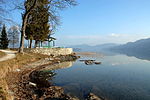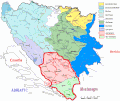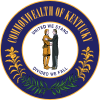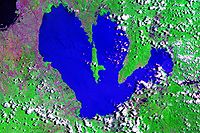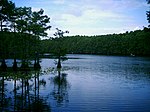Portal:Lakes
The Lakes Portal
A portal dedicated to Lakes
Introduction

A lake is an often naturally occurring, relatively large and fixed body of water on or near the Earth's surface. It is localized in a basin or interconnected basins surrounded by dry land. Lakes lie completely on land and are separate from the ocean, although they may be connected with the ocean by rivers. Lakes, as with other bodies of water, are part of the water cycle, the processes by which water moves around the Earth. Most lakes are fresh water and account for almost all the world's surface freshwater, but some are salt lakes with salinities even higher than that of seawater. Lakes vary significantly in surface area and volume of water.
Lakes are typically larger and deeper than ponds, which are also water-filled basins on land, although there are no official definitions or scientific criteria distinguishing the two. Lakes are also distinct from lagoons, which are generally shallow tidal pools dammed by sandbars or other material at coastal regions of oceans or large lakes. Most lakes are fed by springs, and both fed and drained by creeks and rivers, but some lakes are endorheic without any outflow, while volcanic lakes are filled directly by precipitation runoffs and do not have any inflow streams.
Natural lakes are generally found in mountainous areas (i.e. alpine lakes), dormant volcanic craters, rift zones and areas with ongoing glaciation. Other lakes are found in depressed landforms or along the courses of mature rivers, where a river channel has widened over a basin formed by eroded floodplains and wetlands. Some lakes are found in caverns underground. Some parts of the world have many lakes formed by the chaotic drainage patterns left over from the last ice age. All lakes are temporary over long periods of time, as they will slowly fill in with sediments or spill out of the basin containing them. (Full article...)
Selected article -
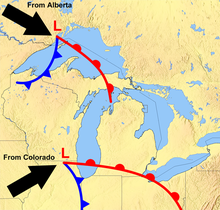
The Great Lakes Storm of 1913, historically referred to as the Big Blow, the Freshwater Fury and the White Hurricane, was a blizzard with hurricane-force winds that devastated the Great Lakes Basin in the Midwestern United States and Southwestern Ontario, Canada, between November 7 and 10, 1913. The storm was most powerful on November 9, battering and overturning ships on four of the five Great Lakes, particularly Lake Huron.
The storm was the deadliest and most destructive natural disaster to hit the Great Lakes in recorded history. More than 250 people were killed. Shipping was hard hit; nineteen ships were destroyed, and nineteen others were stranded. About US$1 million of cargo weighing about 68,300 tons—including coal, iron ore and grain—was lost. The storm impacted many cities, including Duluth, Minnesota; Chicago, Illinois; and Cleveland, Ohio, which received 22 in (56 cm) of snow combined with winds up to 79 mph (127 km/h) and was paralyzed for days.
The extratropical cyclone originated when two major storm fronts fueled by the Great Lakes' relatively warm waters—a seasonal process called a "November gale"—converged. It produced wind gusts of 90 mph (140 km/h), waves estimated at over 35 feet (11 m) high and whiteout snowsqualls. Winds exceeding hurricane-force occurred over four of the lakes for extended periods creating very large waves. The large size of the lakes provides wind fetches (the length of water over which a given wind has blown without obstruction) of hundreds of miles, allowing huge waves to form. Rogue waves are known to occur on the Great Lakes, including waves reinforced by reflections from the vertical shores of some of the lakes. (Full article...)
General topics
| Lake zones |
|---|
| Lake stratification |
| Lake types |
| See also |
Need assistance?

Do you have a question about lakes that you can't find the answer to? Consider asking it at the Wikipedia reference desk.
Categories
More articles
Associated Wikimedia
The following Wikimedia Foundation sister projects provide more on this subject:
-
Commons
Free media repository -
Wikibooks
Free textbooks and manuals -
Wikidata
Free knowledge base -
Wikinews
Free-content news -
Wikiquote
Collection of quotations -
Wikisource
Free-content library -
Wikiversity
Free learning tools -
Wiktionary
Dictionary and thesaurus
External media

- World Lake Database. International Lake Environment Committee Foundation. – provides a searchable database
- Global Lakes and Wetlands Database. World Wide Fund for Nature. – available for free download







































